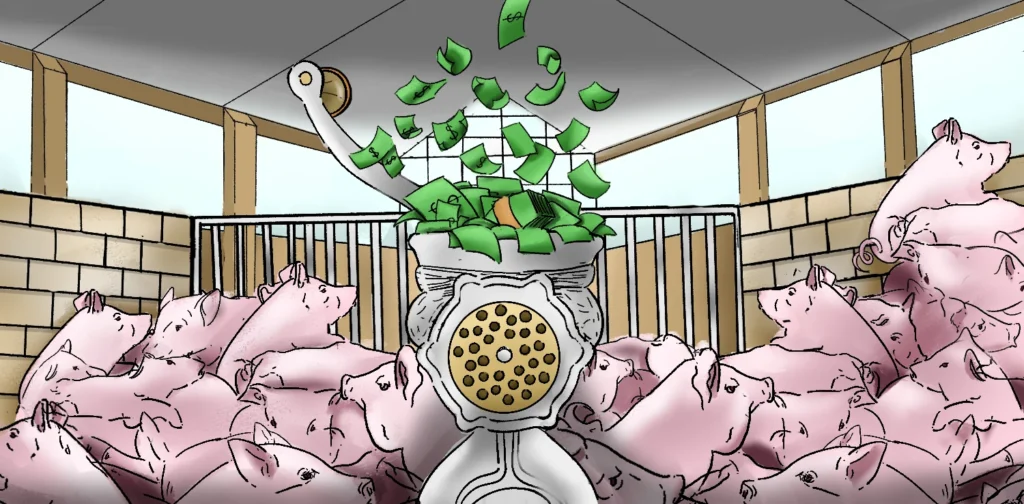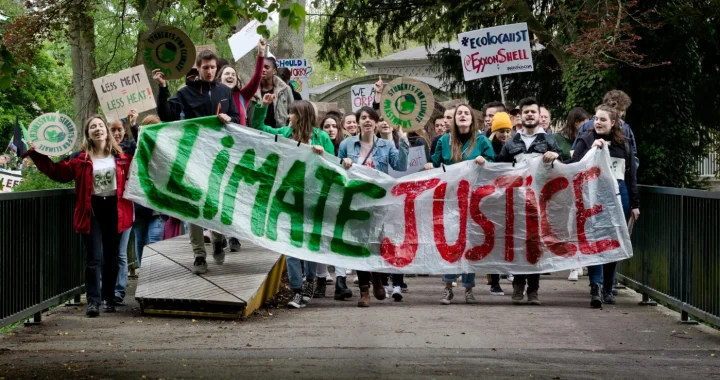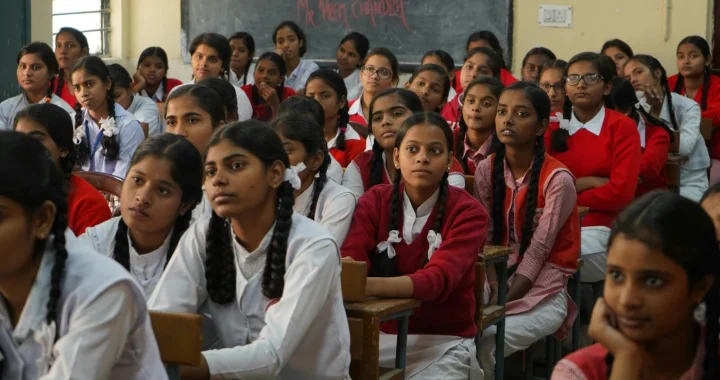Stop Funding Factory Farming in Vietnam: Pathway to Financing a Just and Sustainable Food System

Illustration by Irhan Prabasukma.
Public development banks (PDBs) are meant to help countries grow sustainably. Under the Financial Institutions Net Zero (FINZ) Standard by the Science Based Targets initiative, they are expected to measure and publicly disclose portfolio alignment, halt new fossil fuel expansion, and assess deforestation exposure—including from commodity supply chains linked to industrial livestock. Yet, these financial institutions are using taxpayer money to fund factory farming in Vietnam. Now more than ever, it is time to divest from a system that harms the environment, pushes small farmers out of business, and works against global climate targets.
Global Financing Trend
Vietnam is at a critical juncture. Its economy is growing, and with it, the demand for meat. The answer, according to international development financial institutions, seems to be to expand the industrial animal agriculture sector. They are putting money into factory farming in Vietnam, and this case echoes a troubling global trend.
PDBs, like the International Finance Corporation (IFC) and the Asian Development Bank (ADB), are institutions funded by taxpayers with the goal of fighting poverty and supporting progress in developing nations. While they often fund vital projects in infrastructure and health, their investments in agriculture show a troubling pattern. They sometimes provide support for large-scale pig and poultry operations and massive animal feed mills, often under the guise of “climate-smart” investment. In 2023, development banks spent $3.3B on 62 industrial animal agriculture projects worldwide.
The Shift Toward Factory Farming in Vietnam
This flood of cash is rapidly transforming Vietnam’s food system. For generations, the country’s livestock sector was dominated by small, family-run farms. While these traditional farms still exist and are still the norm, the industry is quickly shifting toward a factory model to meet rising demand.
Development banks and investors label these projects as contributions to economic growth and food security. Yet, concerningly, they ignore the steep costs of environmental damage and the displacement of rural communities.
Industrial animal agriculture or factory farming is a sector notorious for majorly contributing to greenhouse gas emissions, pollution, biodiversity loss, and resource depletion. This model involves raising thousands of animals in high-density confinement, raising concerns of animal welfare as well.
Furthermore, the industrial model requires a level of capital and technology that most small farmers cannot afford. As development bank loans and other financial support flow to large corporations, smaller producers are squeezed out. Between 2011 and 2018, the number of small-scale pig farms dropped from over 4 million to 2.9 million. Moreover, those who remain are often forced into contract farming arrangements that leave them with debt and little power.
Conflicting Claims
Ironically, the same development banks funding factory farming in Vietnam and beyond have public commitments to the UN’s Sustainable Development Goals and climate action. Bank officials argue that these large-scale farms offer an efficient path to meet growing food demand and promote economic growth.
However, this rationale overlooks the long-term damage and ignores the banks’ own policies to protect the environment and vulnerable communities. Yet again, in practice, the promise of short-term returns often overrides principles of sustainable and inclusive development.
This isn’t just happening in Vietnam. We cannot claim to be fighting climate change while simultaneously funding one of its major drivers. FINZ requires financiers to classify activities as ‘in transition’, ‘climate solutions’, or ‘net-zero state’ — factory farming without a credible transition plan does not pass muster.
Financing Just and Sustainable Food System
There is a better way forward. To ensure Vietnam—and beyond—is working toward a just and sustainable food system, the financing mechanism and public development banks must change their approach.
First, PDBs must halt all new funding for industrial livestock projects. This includes direct loans and other forms of financing for large-scale animal production. Projects linked to pollution, community displacement, or labour abuses should be ineligible for public funds.
Second, governments and the public should demand greater transparency. Thus, financial institutions must publish clear environmental and social impact assessments before approving projects and consult with the communities that will be affected.
Third, redirect investments toward sustainable alternatives. Instead of financing factory farms, these funds should support small-scale farmers. Providing access to credit, training in regenerative practices, and connections to markets would empower local communities. Public money should also encourage innovation in plant-based proteins to reduce the reliance on factory farming.
Finally, taxpayers must realize their rights and hold these banks accountable. The public has a right to know how their money is being used and to demand that it aligns with their values.
Vietnam’s food system is at a crossroads. The decisions made today will define its future for decades. We can continue down a path of industrialization that risks the health of our planet and the livelihoods of farmers, or we can invest in a more resilient and equitable model. Ultimately, development finance must help countries build a sustainable future, not lock them into the destructive systems of the past.
Editor: Nazalea Kusuma

Co-create positive impact for people and the planet.
Amidst today’s increasingly complex global challenges, equipping yourself, team, and communities with interdisciplinary and cross-sectoral insights on sustainability-related issues and sustainable development is no longer optional — it is a strategic necessity to stay ahead and stay relevant.
Brian Cook
Brian is a researcher with extensive experience analyzing the intersection of food systems, consumer behaviour, and sustainable development. As Senior Researcher at the University of Oxford's LEAP Programme, he led research on behavioural interventions to promote sustainable diets and reduce meat consumption. He also has conducted research and prepared peer reviewed papers, technical analyses, and evidence briefs for the European Commission, FAO, the World Business Council for Sustainable Development, the Toronto Food Strategy, and the Global Alliance for Improved Nutrition, and other international organizations.


 From Anxiety to Action: How Youth Climate Activism Is Evolving
From Anxiety to Action: How Youth Climate Activism Is Evolving  India’s Supreme Court Declared Menstrual Health and Hygiene as Fundamental Rights
India’s Supreme Court Declared Menstrual Health and Hygiene as Fundamental Rights  Impacts of E-waste Pollution on Animals and Human Health
Impacts of E-waste Pollution on Animals and Human Health  Africa’s Solar Energy Surge: Why 2025 Was a Breakthrough Year
Africa’s Solar Energy Surge: Why 2025 Was a Breakthrough Year  Agrihoods: Integrating Farms and Urban Neighborhoods into Sustainable Communities
Agrihoods: Integrating Farms and Urban Neighborhoods into Sustainable Communities  Women in Waste Management: Asia’s Circularity Runs on Women. Its Policies Still Don’t
Women in Waste Management: Asia’s Circularity Runs on Women. Its Policies Still Don’t